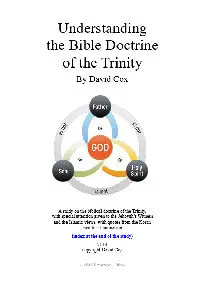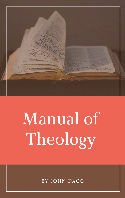Moule Veni Creati is a well know (in past times) work on the Holy Spirit by H.G. C. Moule, (Anglican). It is a deep treatment of the Holy Spirit.
By H.G.C. Moule
Although Moule was an anglican bishop, in his time there were a number of anglican ministers along with Moule that rejected the Catholic Church´s teaching. At times there may be something that you will raise your eyebrows about, but in general, he has a lot of good things to say about his biblical topics. I would not say that I agree 100% with him, but he is a heavy theologian to read after. He has good points. He thinks deeply.
— DRCox
VENI CREATOR*: THOUGHTS ON THE PERSON AND WORK OF THE HOLY SPIRIT OF PROMISE.
BY THE REV. H. C. G. MOULE, M. A., PRINCIPAL OF RIDLEY HALL, AND FORMERLY FELLOW OF TRINITY COLLEGE, CAMBRIDGE; Author of “Thoughts on Christian Sanctity” “On Union with Christ” “On the Spiritual Life,” “Outlines of Christian Doctrine,” “Secret Prayer” etc.
* Veni Creator means “Come Creator” in Latin. — DRCox
FOURTH THOUSAND.
HODDER AND STOUGHTON,
27, PATERNOSTER ROW.
EMMANUEL
Printed by Hazell, Watson, & Viney, Ld., London and Aylesbury,
I INSCRIBE THIS BOOK TO THE DEAR AND HOLY MEMORY OF MY FATHER AND MY MOTHER. IN WHOM THE SPIRIT OF GOD DWELT AND THROUGH WHOM HE WORKED.
H. M. 1801 — 1880.
M. M. M. 1801 1877.
IN PACE.
(From David Cox, theWord module creator of this work. The following are quotes from old English. I am putting a modernized English version below each quote as best as I understand it).
“Yea, saith the Spirit; that they may rest from their labours, and their works do follow them.”
“THOU holy Spirite, we pray to the Strengthe our fayth and increase it alwaye; Comforth our hertes in adversite With trewe beleve bothe nyght and daye.”
“Thou Holy Spirit, we pray to the Strength of our faith and (ask you to) increase it always; Comfort our hearts in adversity, with true belief both night and day.”
Kirieleyson.
“Thou worthy lyght, that art so cleare, Teache us Christe Jesu to knowe alone; That we have never cause to feare In hym to have redempcyon.
“Thou worthy light, that are so clear, Teach us Jesus Christ to know alone; That we have never cause to fear, In him to have redemption.”
Kirieleyson.
“Thou swete love, graunt us altogether To be unfayned in charite; That we may all love one another. And of one mynde alwaye to be.”
“Your sweet love, grant us altogether to be unfeigned (genuine in feeling) in love; That we may all love one another. And of one mind always to be.”
Kirieleyson.
“Be thou our comfortoure in all nede; Make us to feare nether death nor shame; But in the treuth to be stablyshed, That Sathan put us not to blame.”
“(You) Be our comfort in all need; Make us to fear neither death nor shame; But in the truth to be established, that Satan put us not to blame.”
Kirieleyson.”
BISHOP COVERDALE, 1488-1569.
PREFACE.
THE subject of the following chapters needs no prefatory introduction to the Christian reader. In itself eternally and divinely im portant, it has become in the mercy of God a special subject of our own time. Far and wide in the Christian Church, amidst too many phenomena of peril and perplexity, we hail as a phenomenon of good and glorious omen an ever-deepening attention to the divine promises which gather round the truth of the Holy Ghost. More and ever more it is re cognized by those who name the Name of the SON that, alike for individual blessing and for the work and witness of the Community, we depend with an absolute need upon the pre sence and power of the SPIRIT.
May these pages, for all their fragmentary character, be used in some measure by HIM of whom they speak to stir up His saints so always to lay hold on Him that He evermore may lay hold on them, and graciously fill them with Himself.
CAMBRIDGE,
March 28th, 1890.
CONTENTS.
(From theWord module creator, David Cox. I like to put as short chapter titles as possible in my module creations, but this work is bordering on a type very old English work where they used excessively long titles. This present work really doesn’t have chapter titles, just numbers and then a list of descriptions of the sections in each chapter. Therefore, I am only naming these chapter titles or topics in theWord with “Chapter” and the number.)
CHAPTER 1.
Purpose of the Book–Owen’s theory of successive tests of orthodox faith–Present supreme importance of the truth of the Holy Spirit–The Veni Creator at the Pleissenburg–The Personality of the Holy Spirit–John 14-16 the ruling passage for its proof–Affecting the interpretation of Scripture testimonies at large–Reserve in the Scripture exhibition of the Personality Why?–Christ not Himself His subject in the Scriptures–And in His dealings with the soul–The truth of His Personality is full of life and love–The writer’s testimony–It is a truth meant to be prominent in faith and experience–Rightfulness of prayer addressed to the Spirit–Addendum–The Sin of Railing against the Holy Ghost
CHAPTER 2.
(1) “The Dual Procession”–Here to be studied spiritually–What the phrase imports–Light thrown by it on the words, God is Love–And on the connexion between the works of the Spirit and of Christ–Scriptural basis for the belief–Redeeming work of the divine Persons correspondent to Their inner Relations
(2) Work of the Spirit in relation to the Human Nature of Jesus Christ–The Incarnation–The Baptism–The Ministry–The Resurrection–The Epistles to the Churches–The Spirit produced and maintained the Manhood, the Son assumed–It No independent Personality of the Manhood–Yet its holiness and power was by the Holy Spirit–Strengthening power of this truth–Place of Christ in the Spirit’s saving work for us–All parts of the life of grace and faith are by the Spirit–And the Life itself is Christ, in the mystical Union–Thus the Spirit imparts not Himself, but Christ–Practical spiritual importance of holding this truth and wit nessing to it 24
CHAPTER 3.
(1) Union with Christ by the Spirit–Bearing of previous enquiry on this truth–Its spiritual comfort and power–The Spirit’s work in material creation–Noticed only in passing
(2) The Spirit’s work in relation to the Scriptures–Not an easy subject to treat at the present day–Prevalence of humanitarian views of Scripture–Its main cause in a certain mental bias–Unification of phenomena–Inspiration, a term vaguely used–Authority of Scripture–Scripture as literature bears witness to Scripture as oracle–“Consciousness ” of the Scripture writers not known in most cases–But the writings inspired–So viewed and used by our Lord–The Holy Spirit the ultimate and ruling–Author Testimonies to this–How far this limits speculation as to the ” human element”–The First Homily on study of Scripture. 43
CHAPTER 4.
(1) The Holy Spirit as the Interpreter of Scripture–Cowper’s hymn–How is the work done?–Not by supernatural illumination of the nature of infallible intuition–But by impartation of spiritual receptivity
(2) Examination of leading passages in the New Testament dealing with the doctrine of the Holy Spirit–These mainly in St Paul and. St John–St John 3:1-8–Study of ver. 8–“Born of the Spirit”–A phrase to be studied in the light of Scripture on the signs of spiritual sonship–Augustine on 1 John 5:7–“Born of the Spirit”–The whole process is His work”–So is every one,” etc.–Universality of the statement–Significance of the simile employed, the wind–Secrecy of process Independence on human will–Evidence in results–Bearing of these remarks on our view of the function of Baptism–Beveridge on Regeneration 62
CHAPTER 5.
The Spirit convincing of Sin–We retrace our steps, to study in more detail the subject of the New Birth–Conversion–Conviction of sin–John 16:8-11–Points to be remembered in this passage–“The World” the sphere of the work–Some interpret the passage accordingly with slight reference to individual convictions of sin–But these latter are at least not excluded from the meaning of the words–Individual convictions of sin have a powerful influence on general conviction–Appeal to the reader–Conviction of sin experienced irrespective of differences of circumstance and character–Varieties of experience of it–Influence of the experience upon our insight into the whole Gospel–The Cross and the Resurrection are now seen in their true glory–Beata culpa–Such conviction makes personal experience deep–And pastoral ministry faithful and fruitful–Need to the last of an abiding and deve loped work of conviction of sin…. 82
CHAPTER 6.
The Spirit glorifying Christ to the Soul–This is His congenial and beloved work–A fact often forgotten–Bonar on The Gospel of the Spirit’s–Lone The Spirit’s gift of faith–Proof from Scripture that faith is a “gift”–How the gift is given–By the manifestation of Christ’s all-sufficiency to the awakened soul Illustration from common experience–A recent personal example–The work is at once natural and supernatural–The case and testimony of Count Zinzendorf–Personal appeal to the reader–Realities of experience, lighting up truths of doctrine–Let us love Him who loves thus to bless us–Hart’s hymn 100
CHAPTER 7
The Spirit’s Work as further seen in our Lord’s last Discourse and Prayer, John 14-16.–The whole life of the regenerate is to the last by the Spirit–In the present passage the Holy Spirit is implied even where not mentioned–And the passage bears not on the Apostles only, but on all believers–Who are in some respects represented by the Apostles–Oneness of believers with Christ by the Spirit–Depth and preciousness of that truth–An appeal–They live by Christ, through the Spirit–Holy realities of personal experience of this–A record and testimony–Fruit-bearing by the Spirit–Prayer in the Spirit–Its connexion with fruit-bearing–Miss F. R. Havergal–“Greater works than these”–Teaching work of the Holy Spirit–The “unction” of 1 John 2–The keeping and sanctifying of the saints by the Spirit–Let us live in the Upper Chamber. . . 122
CHAPTER 8.
The Spirit’s Work as seen in John 7 and John 20, etc.–A chapter of fragments–(i) John 7:37-39–The Tabernacle-feast–The Saviour’s “cry”–A majestic invitation and promise–At once interpreted by St John–How “the Spirit was not yet given”–Diffusive character of the Gospel age–How the water shall flow from the man–(ii) John 20:21-23–The occasion–The act of breathing and its significance–The words–What they do not mean–They mean not mediation, but declaration–To be done by all true Christians, though not anarchically–To be done in the power of the Spirit–(iii) 1 John 2:20, 27; 3:24–The spiritual believer is in a humble sense a prophet–(iv) Rev. 5:6–The Spirit seen in vision as the Vehicle of Christ’s power and presence for His Church below. 145
CHAPTER 9.
The Spirit in the writings of St Paul: in general–Great fulness of Pauline teaching on the Spirit’s work–This is the more remarkable, as St Paul is the Apostle of Justification–Lessons of this fact–Justifying Righteousness and the Spirit’s Work distinct in conception, indissoluble in divine intention–And in the true experience of the Christian St Paul’s witness to the Personality of the Spirit–And to the Union of being and work between the Spirit and the Son–And to the agency of the Spirit in the whole work of grace–New Birth–New Life and Walk–Union with Christ–Revelation of divine truth and blessing–Of the certainty of Adoption–And of paternal Love–Rom. 5:5 explained–And Rom. 8:16–The work of the Spirit in the believer’s soul and life seen in details.–The flesh and the Spirit.–Encouraging aspect of Gal. 5:17–Liberty in the Spirit–Need of realizing our possession of power by the Spirit 163
CHAPTER 10.
The Spirit in the writings of St Paul: the Fruit of the Spirit–Topics of the Epistle to the Galatians–Justification–And the Spirit’s work–Their connexion–Abundance of teaching on the work of the Spirit towards the close of the Epistle–“Not under the law”–“Led by the Spirit”–“Sowing to the Spirit”–The Fruit of the Spirit contrasted with the works of the flesh Significance of the singular number, Fruit–The place of “diligence” in fruit-bearing–Meanwhile, it is a power not our own which bears the fruit–It is the Holy Spirit–While Christ is the Life He gives–The Fruit Primarily, it consists in not doing, but being–Not that the spiritual Christian is to isolate himself from common life and duty–The Fruit is a Character–Its elements Nine, in three triads–All harmonized in one–This character is essentially one of love and light–And of yielding and forbearance–And of vigilant practicality–The description of the Fruit of the Spirit should be a touchstone of the inner life. 186
CHAPTER 11.
The Spirit in the writings of St Paul: the Fulness of the Spirit–Scriptural illustrations of the phrase–Varying phases of the “Filling”–Connexion between the Fulness and miraculous gifts–Are the two always connected?–No; the Fulness has a more abiding connexion with consecration to the will of God–Not that miracles are necessarily confined to the first age–Eph. 5:18 explained–It refers not to an abnormal crisis, but to the rule and habit of life–Filled “in” the Spirit; how?–Practical meaning of the precept–Surrender to the presence of the Spirit–The Baptism of the Spirit Passages examined–Is it to be sought for, like the Filling?–Apparently not Work of faith in receiving the fulness of the Spirit–Blessed results in detail–The Sealing, Earnest, and Firstfruits of the Spirit–A Prayer. . 209
CHAPTER 12.
The Spirit in the writings of St Paul: Christ dwelling in the heart by faith–Sacred treasures of the close of Eph. 3.–The passage takes up that at the close of Eph. 2.–Likeness and difference between the two passages–The former contemplates the Community, the latter rather the Individual–Context of Eph. 3:17–The Indwelling–It means more than the Vital Union–Significance of the word “heart”–The Indwelling designed for all believers–And to be continuous–The language implies an Arrival in order to dwell–In what senses such an arrival is and is not for all Christians–The work of the Holy Spirit in this matter–Strengthening–In order to a willing welcome of the divine MASTER–Nature in the fall shrinks from this–So the Spirit’s enabling is needed–Significance of the words “by faith”–Faith in this as in all its work is the Spirit’s gift–Conclusion–Dying words of Adolphe Monod, 228
INDEXES 248
Note from Module Creator David Cox [email protected]
This work is taken from archive.org, and it is OCRed by them. We thank Archive.org for having a tremendous amount of old good books on their website. They do a great job! Unfortunately, the OCR process is not corrected for obvious problems. Therefore, there are several thousand (or more) misspelled words, and incorrectly interpreted characters. On top of that, the format of the verses are not what theWord wants. For example, John iii. 16 is not going to be read and tooltipped in theword. Therefore, I am making a lot of changes in this work. If you doubt a particular place, the phrase or words that are here, then go find it following the Archive.org link, and you can check it yourself. These modules are formatted by Pastor David Cox (me) for my own personal Bible studies. Therefore, since I am cleaning these file up, and nobody seems to want to ever donate even a cup of coffee (if you want to help out, go https://www.paypal.com/paypalme/davidcoxmex), I am making them are useful for me. That is my first priority, and it is by the pure grace of God that I am offering these files to anybody else, much less putting them up on the Internet in various websites and formats (also in English and Spanish). As a note, I have about 20 gigabytes of traffic each month on all of these websites, and I have normally zero donations. Great that I get the blessing in heaven for paying for all the related charges, billing, work making websites, work defending them from hackers, and other people who copy my material wholesale without permission, without donating, and without giving me credit. But God knows what we all do, and He is the final one that decides on rewards.
Download
Moule-veni-creati-pdf.pdf (1274 downloads )For MySword: Moule Veni Creati
For theWord: Moule Veni Creati
More Works on the Holy Spirit
- Wolston Another Comforter
- Warfield The Spirit of God in the Old Testament
- Walvoord The Person of the Holy Spirit
- Torrey, R.A. – Person and Work of The Holy Spirit
- Sweeney The Spirit and the Word
- Ryle, J.C. – Having the Spirit
- Moule Veni Creati
- MacNeil John Spirit Filled Life
- Kuyper Abraham Sanctifying Work of the Holy Spirit
- Jarrett Abiding Presence of the Holy Ghost in the Soul






